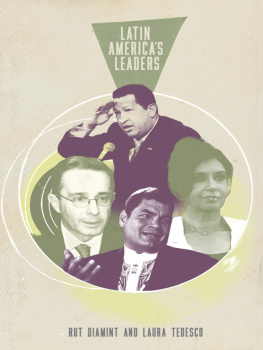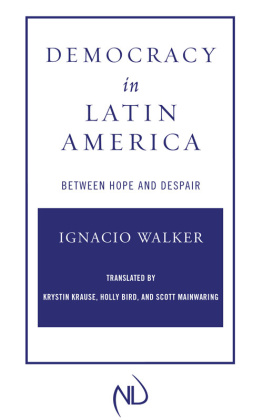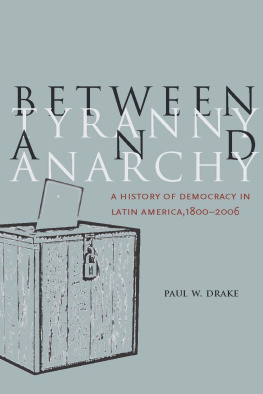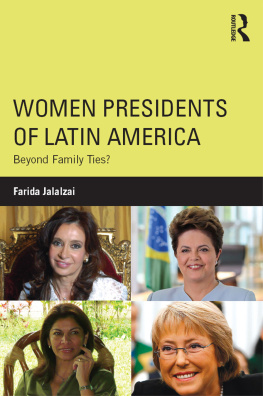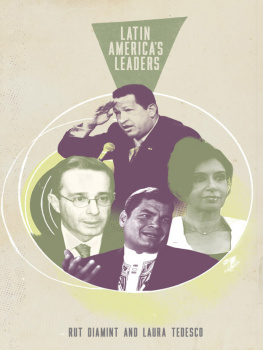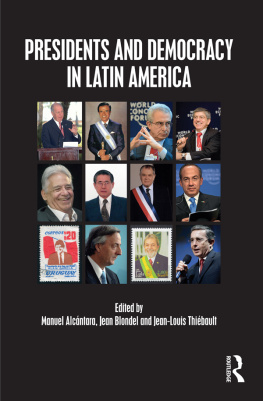Latin Americas Leaders
About the Authors
RUT DIAMINT is professor of international relations in the Department of Political Science and International Studies at Universidad Torcuato di Tella, researcher at the National Council for Scientific and Technological Research (CONICET) and a member of the Advisory Committee of Club de Madrid and the UN Secretary General Advisory Board on Disarmament Matters. She has been visiting professor at Columbia University, and has received scholarships from Fulbright, the Woodrow Wilson International Center for Scholars, the PIF programme of the Canadian government, the Tinker Foundation, the UN Commission for Peace Studies and the US Studies Center for USMexican Studies, University of California at San Diego.
LAURA TEDESCO is associate professor of political science at Saint Louis University, Madrid Campus, and at Instituto de Empresa, Madrid. She has received scholarships from the British Council, the Foreign and Commonwealth Office and CONICET (Argentina) and grants from the British Academy and the Open Society Institute. She has taught at Universidad de Buenos Aires, FLACSO, the University of Warwick and the University of East Anglia. She has been a consultant for UNICEF and worked as an analyst for FRIDE, Spain.
Latin Americas Leaders
RUT DIAMINT AND LAURA TEDESCO
Latin Americas Leaders was first published in 2015 by Zed Books Ltd,
The Foundry, 17 Oval Way, London SE11 5RR, UK.
www.zedbooks.co.uk
Copyright Rut Diamint and Laura Tedesco 2015
The rights of Rut Diamint and Laura Tedesco to be identified as the authors of this work have been asserted by them in accordance with the Copyright, Designs and Patents Act, 1988.
Typeset in Monotype Bulmer by Lumina Datamatics Ltd.
Index: John Barker
Cover designed by www.stevenmarsden.com
All rights reserved. No part of this publication may be reproduced, stored in a retrieval system or transmitted in any form or by any means, electronic, mechanical, photocopying or otherwise, without the prior permission of Zed Books Ltd.
A catalogue record for this book is available from the British Library.
ISBN 978-1-78360-103-5 hb
ISBN 978-1-78360-102-8 pb
ISBN 978-1-78360-104-2 pdf
ISBN 978-1-78360-105-9 epub
ISBN 978-1-78360-106-6 mobi
To Alex, Simona, Ema, Matilda, Luna and Rita
Contents
Figures and Tables
Acknowledgements
This book is the result of seven years of collaborative study. We began to debate the democratic quality of Latin American political leaders in 2008. In the beginning our discussions were part of informal meetings. Slowly we became more intrigued about political leaders in Latin America and a literature review started to take shape. We realized that the bibliography on political leadership in the region was very limited. Although political leaders have always been important in our region, academics have neglected their study, while internationally the bibliography about political leadership was growing. Thus, we established an agenda to discuss research questions on leadership, and at the beginning of 2009 started to work on a research proposal.
Our project was accepted by the Foundation of Open Society Institute (FOSI) in Washington, DC. We want to thank Mara Victoria Wigodsky, who shared our enthusiasm for and preoccupation over political leaders. FOSI gave us generous financial support for three years, which allowed us to conduct interviews in Buenos Aires, Bogot, Caracas, Montevideo, Quito and Washington.
We were able to manage the project, prepare events and organize the interviews thanks to a fantastic team of collaborators in different countries. Juan Pablo Ochoa (Quito); Juan Pablo Lpez Gross (Caracas); Ariadne Garca (Montevideo); Ivonne Patricia Len (Bogot) and Mara Beln Fernndez Milmanda, Valentina Waisman and Elliot Sucari (Buenos Aires) have been the best group of assistants that a researcher can have. They prepared the agenda for the interviews, listened to all the interviews and transcribed them, wrote some of the reports and literature reviews and managed to work with two difficult directors who were miles apart.
Many friends and colleagues helped us discover and explore the fascinating world of politicians. We would like to thank Mara Matilde Ollier, John Magdaleno, Carlos de la Torre, Miguel Serna, Jorge Lanzaro, Alejo Vargas Velsquez, Benigno Alarcn, Osvaldo Hurtado, Susanne Gratius, Carlos Gervasoni, Enrique Peruzzotti, Juan Carlos Torre, Lorenza Sebesta, Ernesto Calvo, Csar Montfar, Betty Amores, Normay Wray, Adrin Bonilla, Simn Pachano, Pablo Celi, Bertha Garca, Julin Gonzlez Guyer, Martn Balza, Alberto Curiel, Arlene Tickner, Francine Jacome, Johanna Mendelson Formann, Michael Shifter, Jos Miguel Vivanco, Adam Isacson, Andrs Serbin, Juan Rial, Domingo Erwin, Heather Booth and Albis Muoz.
Mary Ingram helped us with translation and editing. Kika Sroka-Miller, our editor at Zed Books, has been fabulous, patient and always happy to help us.
We could not have done our work without the generosity of our interviewees. We enjoyed every interview. There was a bit of everything: professionalism, tension, laughter, friendliness and a lot of information. Some of them opened up their houses to us. Others waited for us in bars or restaurants. But most of the interviews took place in government buildings, which allowed us to witness the beauty of some congresses and houses of government but also to see much decadence. We want to thank wholeheartedly all of our interviewees. Both of us have learned a lot from all of them.
INTRODUCTION
History does not move forward in a straight line but when skilled and determined leaders push, it does move forward
Samuel Huntington, The Third Wave (University of Oklahoma Press, 1992)
Latin America is widely known for its leaders. It is a continent that has produced political leaders that have gained global recognition for good and ill. It is closely associated with leaders whose political projects have resonated far beyond their own countries. In Argentina, Juan Domingo Pern inspired a particular kind of nationalist populism. In Chile, the name of Augusto Pinochet became almost synonymous with the brutality of military dictatorship. Fidel Castro still stands as an emblematic figure of revolutionary resistance and, for many, of undemocratic rule. In more recent times, Hugo Chvez developed a leftist project that attracted followers and critics around the world. The novels of writers like Gabriel Garca Mrquez and Mario Vargas Llosa have given us memorable literary figures based on the popular image of the Latin American caudillo.
In the last decade, Latin America has experienced a variety of political trends. And, crucially, the marked differences between Latin American states have much to do with contrasting leadership styles. As the region made the transition from dictatorship to democracy and then into a prolonged debt crisis, the intensity of its challenges gave birth to very different types of leaders. In Brazil, Uruguay and Chile, a succession of skilful and consensus-building leaders were have exerted a defining influence over their respective countries political development.
These twin trends form the subject of this book. First, leadership matters in Latin America, probably more than in any other region. Secondly, a greater diversity of leadership styles has taken root in the region during the last decade. We will show not only how and why leadership styles matter, but that there is a strong link between the structure of party systems and different leadership styles.

